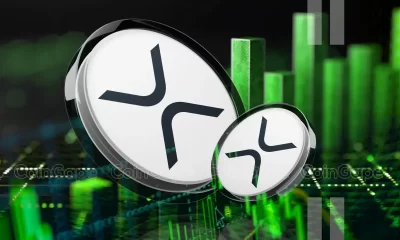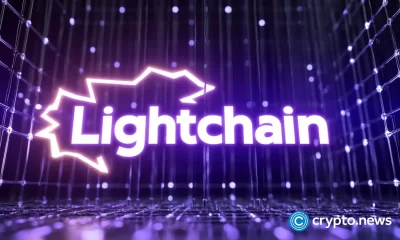Bitcoin Wallets
Protect Your Non-Custodial Bitcoin Wallet — Support The Open Dialogue Foundation
Published
1 day agoon
By
admin


In a new report, the Open Dialogue Foundation (ODF) provides an overview and analysis of upcoming regulatory proposals around non-custodial Bitcoin and crypto wallets in the European Union (E.U.).
Some of the proposals — many of which are based on FATF recommendations — will negatively affect users’ ability to transact with crypto assets privately.
EU & FATF 2025: Your Bitcoin Wallet's New Rules?
What is the best Christmas gift from human rights, privacy and Bitcoin advocates?@ODFoundation provides you with a comprehensive respond on what you should know while using #Bitcoin p2p wallet, privacy payments tools &… pic.twitter.com/YZIlCZjSiR
— Lyudmyla Kozlovska 🇪🇺🇺🇦 (@LyudaKozlovska) December 24, 2024
Important takeaways from the report include:
- According to guidelines from the European Banking Authority (EBA), the current regulatory framework around crypto assets in the E.U. allows for actions that pose significant risks, including immediate withdrawals to non-custodial wallets and the use of anonymity-enhancing tools like mixers.
- Forthcoming Markets in Crypto-Assets Regulation (MiCA) regulation may influence Crypto-Asset Service Providers (CASPs) to adopt stricter AML/KYC practices.
- Regulation from the E.U. may prohibit CASPs from facilitating anonymous transactions, which would both reduce privacy for users of crypto-assets and increase operational costs for CASPs.
- The obligations that may be imposed on CASPs will conflict with the rise of proliferation of open-source technologies like the Lightning Network, Fedimint and ecash, which let users transact privately and in a censorship-resistant manner.
Do I share this all because I’m trying to ruin your holiday season? No, sirs and ma’ams.
I share it because we should be grateful for the work that the Open Dialogue Foundation does in shedding light on what’s happening within the regulatory landscape in the E.U. (especially as it pertains to non-custodial crypto wallets) and in developing relationships with elected officials in the E.U. to educate them on the importance of Bitcoin and other freedom technologies.
So, if you’re looking to make a tax-deductible donation to a nonprofit before the year is out, consider donating to the ODF.
And if you’re thinking either “Well, I don’t live in the E.U., so this doesn’t affect me” or “I do live in the E.U., but I’ll just move if it passes bad regulation,” I’d asking you to consider the following two points, (the first of which I lifted directly from this recent ODF report):
- The European Union plays a central role in shaping global financial regulatory standards (which means that crypto transaction privacy advocates across the globe have something at stake here).
- The organization making many of the proposals for the new regulatory framework in the E.U. — the FATF — is an international one, and it will leverage any wins it chalks up in the E.U. to influence regulation in other jurisdictions.
But, again, don’t be scared; be grateful.
Donate to the ODF to support its efforts, or do what you can to amplify the organization’s messaging.
This article is a Take. Opinions expressed are entirely the author’s and do not necessarily reflect those of BTC Inc or Bitcoin Magazine.
Source link
You may like


Shiba Inu Burn Rate Soars 100% As Community Lauds Major Milestones


A Very Bitcoin Christmas


From DMM Bitcoin to the US Government: Largest Crypto Exploits and Hacks of 2024


Access control exploits account for nearly 80% of all crypto hacks in 2024


Will XRP Price Break All-Time Highs In 2025?


Why it’s a better investment than Solana or Ripple in 2024
Bitcoin Wallets
Mastercard Launches Euro Denominated Non-Custodial Bitcoin Debit Card
Published
4 months agoon
September 5, 2024By
admin

Mastercard has partnered with Bitcoin and crypto payments provider Mercury to launch a euro-denominated debit card allowing users to spend Bitcoin and crypto directly from non-custodial wallets, as per Cointelegraph.
JUST IN: 🇪🇺 Mastercard launches euro non-custodial #Bitcoin and crypto debit card.
They have over 100 MILLION merchants 🚀 pic.twitter.com/xpASRDrhVx
— Bitcoin Magazine (@BitcoinMagazine) September 5, 2024
The card enables European Bitcoin holders to spend from their self-hosted wallets at any of Mastercard’s over 100 million merchants globally without needing to custody funds with an intermediary.
Mastercard is a payments titan serving nearly 1 billion customers in over 210 countries. This latest integration reflects the company’s growing efforts to bridge Bitcoin with its sprawling traditional payments infrastructure.
“We are providing consumers who want to spend their digital assets with an easy, reliable, and secure way to do so, anywhere Mastercard is accepted,” said Christian Rau, Senior Vice President of Mastercard’s crypto unit.
The card allows spending Bitcoin and other crypto simply by connecting a non-custodial wallet. Users avoid selling Bitcoin and crypto on an exchange before spending, maintaining full ownership. However, Mastercard’s card does have fees, including a €1.6 issuance fee, €1 monthly maintenance fee, and a 0.95% transaction fee.
Nonetheless, by supporting non-custodial wallets, Mastercard addresses a major pain point and grants users the flexibility to directly control their Bitcoin and crypto. The move caters to a growing audience preferring self-hosted wallets over centralized exchanges.
Source link
Bitcoin
Dormant Bitcoin wallet from 2014 moves BTC worth $10.2m
Published
4 months agoon
August 17, 2024By
admin

A Bitcoin wallet that has been dormant since 2014 suddenly woke up and moved over 174 bitcoins worth more than $102 million.
Blockchain data showed that the Bitcoin (BTC) wallet that received 174.88 BTC on Jan. 8, 2014, moved funds for the first time on Aug. 16, 2024.
The transfer comes after a decade, during which Bitcoin’s price soared to highs of $73,000 before retreating to current levels.
Transaction cost
While BTC’s initial value was nearly $142,000 in 2014, the staggering gains the flagship cryptocurrency has seen since mean that the 174.88 bitcoin is now worth more than $10.2 million.
Blockchain tracker Whale Alert spotted this dormant Bitcoin wallet movement on Aug. 16.
The transaction fee for the transfer was 67,500 satoshis, or $39.43, which is considerably low. However, per mempool details, this was still an overpayment of 50x that saw the $10.2 million transaction confirmed quickly.
In October 2018, the wallet’s holdings totaled about $896,000, and crossed the $5 million mark in late January 2021.
According to data on blockchain explorer Blockchair, the addresses’ balance currently stands at 0.00004226 BTC, worth $2.50 at the current Bitcoin price of $59,300.
Bitcoin wallets waking up
The last few months have seen a rising frequency of dormant Bitcoin addresses waking up to move millions of dollars worth of BTC. It’s notable that Satoshi-era addresses — those holding coins mined in the first few months of Bitcoin creator Satoshi Nakamoto’s time — have not been common.
However, the past few months have seen multiple dormant wallets suddenly move, including one that woke up after a 12-year hibernation to transfer $6.9 million in BTC in July this year. Another wallet sent $3 million in BTC to Binance in June after being dormant for over 14 years.
Whale Alert also spotted this other dormant wallet movement.
Currently, about 18.3 million BTC are in dormant Bitcoin wallets. BitInfoCharts data shows a sharp rise since January 2024, when cumulatively, dormant BTC wallets held about 7.4 million coins.
In most cases, investors watch the movement of BTC in dormant wallets as potential sources of fresh supply pressure on prices. ‘Sell wall’ investors often see prices struggle, resulting in huge volatility.
Source link

Shiba Inu Burn Rate Soars 100% As Community Lauds Major Milestones

A Very Bitcoin Christmas

From DMM Bitcoin to the US Government: Largest Crypto Exploits and Hacks of 2024

Access control exploits account for nearly 80% of all crypto hacks in 2024

Will XRP Price Break All-Time Highs In 2025?

Why it’s a better investment than Solana or Ripple in 2024

Six Bitcoin (BTC) Mutual Funds to Launch in Israel Next Week: Report

What Happens If Paul Atkins Dismisses the XRP Lawsuit?

Malicious Google ad campaign redirects crypto users to fake Pudgy Penguins website

BlackRock Bitcoin ETF (IBIT) Records Largest-Ever Outflow of $188M

Solana (SOL) Gearing Up: Is a New Surge on the Horizon?

XRP, SOL, NEAR, DOGEN, and DOT poised to explode

Crypto Trader Turned $90 Into $3.25M As Token Skyrockets 5,500%

Here’s a Potential Downside Price Target for Cardano If ADA Sees New Correction, According to Benjamin Cowen

Which crypto will explode in 2025? Expert insights and predictions
182267361726451435

Why Did Trump Change His Mind on Bitcoin?

Top Crypto News Headlines of The Week

New U.S. president must bring clarity to crypto regulation, analyst says

Will XRP Price Defend $0.5 Support If SEC Decides to Appeal?

Bitcoin Open-Source Development Takes The Stage In Nashville

Ethereum, Solana touch key levels as Bitcoin spikes

Bitcoin 20% Surge In 3 Weeks Teases Record-Breaking Potential

Ethereum Crash A Buying Opportunity? This Whale Thinks So

Shiba Inu Price Slips 4% as 3500% Burn Rate Surge Fails to Halt Correction

Washington financial watchdog warns of scam involving fake crypto ‘professors’

‘Hamster Kombat’ Airdrop Delayed as Pre-Market Trading for Telegram Game Expands

Citigroup Executive Steps Down To Explore Crypto
Mostbet Güvenilir Mi – Casino Bonus 2024

NoOnes Bitcoin Philosophy: Everyone Eats
Trending

 3 months ago
3 months ago182267361726451435

 Donald Trump5 months ago
Donald Trump5 months agoWhy Did Trump Change His Mind on Bitcoin?

 24/7 Cryptocurrency News4 months ago
24/7 Cryptocurrency News4 months agoTop Crypto News Headlines of The Week

 News4 months ago
News4 months agoNew U.S. president must bring clarity to crypto regulation, analyst says

 Price analysis5 months ago
Price analysis5 months agoWill XRP Price Defend $0.5 Support If SEC Decides to Appeal?

 Opinion5 months ago
Opinion5 months agoBitcoin Open-Source Development Takes The Stage In Nashville

 Bitcoin5 months ago
Bitcoin5 months agoEthereum, Solana touch key levels as Bitcoin spikes

 Bitcoin5 months ago
Bitcoin5 months agoBitcoin 20% Surge In 3 Weeks Teases Record-Breaking Potential


